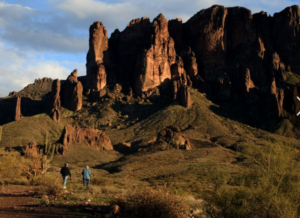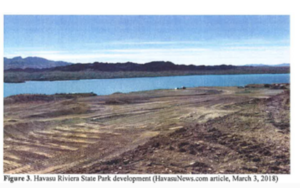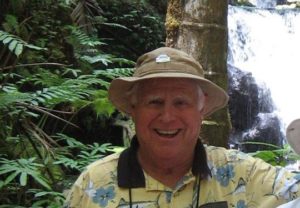Source: Craig Harris, Arizon Republic – October 29, 2018
Arizona State Parks & Trails has dug up and bulldozed Native American and other archaeological sites without preserving artifacts in a rush to build visitor attractions and make money, a state archaeologist claims. In one case, Parks unearthed ancient stone tools and caused “irreversible” damage to a site dating back 12,000 years, according to agency memos.
The archaeologist, Will Russell, told The Arizona Republic he repeatedly cautioned Parks officials that
the work could violate the law and destroy artifacts, but he was overruled and even threatened by top  agency managers, including Parks Director Sue Black. “There are dozens of archaeological sites that have been wrecked” because Parks officials didn’t want to delay development plans, Russell told The Republic. Russell left his job with Parks on Oct. 15 and now works for another state agency.
agency managers, including Parks Director Sue Black. “There are dozens of archaeological sites that have been wrecked” because Parks officials didn’t want to delay development plans, Russell told The Republic. Russell left his job with Parks on Oct. 15 and now works for another state agency.
A high-ranking administrator in Gov. Doug Ducey’s administration appeared to share Russell’s concerns in a July 25 email obtained by The Republic. Interim Parks Deputy Director Bret Parke wrote about cultural resources “being impacted by development projects,” according to the email. Parke warned the agency in bold letters to not proceed “with any land disturbance without getting clearance” from Russell. Copied on Parke’s email were Black, a Department of Administration executive and Russell.
Russell said agency planners ignored that warning, and in mid-September Parke was moved from Parks to the Department of Environmental Quality, where he had previously worked. Megan Rose, spokeswoman for the Arizona Department of Administration, said ADOA is “actively reviewing the allegations brought forth by Dr. Russell,” and could not comment further. Multiple attempts to reach Parke were unsuccessful. A spokeswoman for DEQ declined to let Parke comment. Black, subject of three separate state investigations for mistreating employees, declined repeated requests for comment.
Russell said he took his concerns directly to Parke, the interim deputy director, who also was a lawyer at ADOA and has close ties to Gov. Doug Ducey and officials in the Governor’s Office. Russell called it curious that ADOA was only now investigating his claims — after officials became aware that he had talked to The Republic. Parks spokeswoman Michelle Thompson declined to answer questions because Russell’s allegations are “under review.” Thompson did not elaborate. Paula Pflepsen, an archaeologist who was Park’s cultural resource manager until she quit in February 2017, said she had the same concerns about work at the agency.
‘Dozens’ of sites wrecked
Russell said disagreements over preservation grew so intense Black stormed into his office one day last 
spring and yelled at him. She cocked her arm with a clenched fist, threatening to hit him, he said. Russell said as a result he was rarely permitted to leave the agency’s central office to conduct archaeological surveys or do damage assessments at the state’s 35 parks. He also wasn’t allowed to communicate with field staff or other governmental agencies, he said. “The agency’s mission is to protect and preserve natural and cultural resources, but we aren’t doing any of that. We are just putting up cabins and making money,” Russell said. “One of her favorite adages is ask for forgiveness rather than permission. But she doesn’t even ask for forgiveness, and she certainly never tries to go back and fix problems.”
Russell claims that under Black’s direction, the agency:
- Built a garden in an archaeological site at Tonto Natural Bridge State Park, north of Payson, after being told to wait for an archaeological investigation. Russell noted in an April 14 memo to three Parks executives that the damage affected historic properties and “is irreversible, was not authorized, and was not monitored by a qualified archaeologist.” The memo also says work at the site exposed artifacts including “two lithic tools.” The site likely has “been visited or occupied over the span of 12 millenia or more,” and could have provided information about Apache subsistence and demography that has “thus far eluded Southwestern archaeologists,” he wrote.
- Expanded a picnic area into a historical homestead site at Slide Rock State Park in Oak Creek Canyon, north of Sedona. In March 16 memo, Russell noted a historic roadway ended at a large area that had been bulldozed and unauthorized development work had been done, causing “land disturbance.” “This is a serious violation of several statutes, policies and acceptable practices,” Russell wrote. “If an ancestral Native American sited had been damaged, it would have added considerable liability.”
- Built a trail in 2016 at Granite Mountain Hotshots Memorial State Park near Yarnell that went through a Native American archaeological site after being warned not to. Russell said when he tried to address the problem, Black rebuffed his efforts and removed him from his role as tribal liaison.
- Refused to allow employees responsible for environmental or archaeological compliance to do their jobs.
Walter “Skip” Varney, the agency’s former chief of development, called Russell “very reputable” in his field. Varney, who left Parks in May, confirmed all of Russell’s allegations except those involving the Granite Mountain Hotshots Memorial State Park, saying in that case proper procedures were followed. Varney said Russell’s greatest concern “was to make sure we took care of archaeological sites and did it properly.” “She (Black) was frustrated with the archaeological process,” said Varney, who once served as Black’s deputy director. “She wanted to get projects on the ground, and she and Will went back and forth. … It was all about new development and squeezing in as many campsites and trailers.”
State law prohibits defacing sites
The Arizona Antiquities Act outlines how archaeological and paleontological discoveries on state land should be reported and handled. It prohibits defacing protected sites and artifacts. Russell said county attorneys, the state Attorney General and U.S. Attorney’s Office prosecute alleged violations of that law, depending on where the violations are alleged to have occurred. Pflepsen said Parks, under Black, regularly violated the state Antiquities Act in order to generate additional development revenue. Parks would have to ask authorities for such an investigation.
Russell said he raised his concerns with the State Historic Preservation Office, which assists entities in complying with historic preservation laws. SHPO is also under Black’s jurisdiction. State Historic Preservation Officer Kathryn Leonard said she was unable to comment without Black’s authorization. The agency did not allow Leonard to speak to The Republic. Russell also made his complaints known to various tribes and federal agencies during his roughly one year on the job.
‘What is your true intention?’
The most heated exchange between Russell and Black arose from his questions about Parks land near Lake Havasu, slated for development as the Havasu Riviera resort. Russell said the land was bulldozed without proper archaeological compliance.
When Russell posed questions about the site in a March 29 memo to state and federal agencies and several Native American tribes, he said Black stormed into his office and screamed at him. “She said ‘How dare you do this? This is a $300 million project, and you could have derailed the whole thing,'” Russell said. “Then she leaned over me with a clenched fist and said, ‘What is your true intention?'”
Russell said Deputy Director Jim Keegan the next day forced him to sign an apology letter to those agencies and tribes and retract his concerns. The terse, four-paragraphletter, which Russell said he did not write, states he had not “exhausted all of my internal resources in researching the background on the project” and that he didn’t follow proper protocol. The statement, on Parks letterhead, refers questions to Keegan, a longtime friend of Black’s who has a felony criminal record.
The style of writing in the apology letter differs greatly from the technical writings of Russell in hundreds of other documents he provided to The Republic. Russell said Keegan wouldn’t let him leave the building to pick up his children until he signed the letter, and he was afraid Black would fire him. Russell said he signed it after insisting that some of the grammar be corrected. In retrospect, Russell said he’s embarrassed he signed the letter. “I never should have allowed that to happen,” he said. Keegan, when reached Thursday on his personal cellphone, referred questions to Thompson, the agency spokeswoman. She declined to comment.
Rapid turnover continues at Parks
Russell became the 36th full-time employee to leave the agency this year. The agency has 179 employees; 118 have quit or been fired since Ducey appointed Black in February 2015, according to public records obtained by The Republic. After The Republic requested comment regarding Russell’s claims the Governor’s Office said in a statement Wednesday that the allegations are “under review.”
“This administration cares deeply about protecting and preserving Arizona’s history and we expect our  agencies to conduct their operations accordingly. We’ve also placed priority on forging strong relationships with Arizona tribes and the Native American community at all levels of state government,” said Daniel Ruiz, a spokesman for Ducey. Black has during her tenure faced numerous allegations of inappropriate and disrespectful behavior, including berating employees in front of other staff, disclosing confidential information, using racial slurs, getting drunk and belligerent while representing the agency at conferences, and trying to circumvent the state procurement code.
agencies to conduct their operations accordingly. We’ve also placed priority on forging strong relationships with Arizona tribes and the Native American community at all levels of state government,” said Daniel Ruiz, a spokesman for Ducey. Black has during her tenure faced numerous allegations of inappropriate and disrespectful behavior, including berating employees in front of other staff, disclosing confidential information, using racial slurs, getting drunk and belligerent while representing the agency at conferences, and trying to circumvent the state procurement code.
The allegations have led to three investigations, but Black has faced no discipline other than to have one of Ducey’s top administrators counsel her on how to treat employees. Russell, 46, is the first former employee to publicly accuse Black of ignoring state and federal laws to boost revenue at Parks and has released documents to support his claims. He provided The Republic with hundreds of records, including some that were redacted. He said some of the issues arose before he started working at Parks in June 2017.
‘She doesn’t think compliance laws apply to her’
Despite a stream of controversies at Parks, Duceyhas continued to stand behind Black, praising her efforts to raise revenue at the agency and citing her winning a national award even as she has faced investigations of allegations that she has mistreating staff. Ducey gave her a raise of more than 9 percent in November 2016, bringing her annual pay to $175,000. Black’s predecessor was paid $136,000 annually. The agency has distributed several photos of a smiling Ducey with Black, who is holding the award recognizing the nation’s best-run state parks program. Ducey’s campaign spokesman, Daniel Scarpinato, declined to answer questions about the latest allegations against Black.
After leaving Parks this month, Russell, who studied anthropology at Arizona State University, where he earned his Ph.D. in 2016, was hired to do similar work for the state Department of Transportation. “All Sue Black cares about is her image and making money,” Russell said. “She doesn’t think compliance laws apply to her. She doesn’t think she needs permits to excavate or to do (archaeological) surveys. And she sees no point in collaborating with tribes.” Russell also questioned why Ducey keeps Black in her job in the face of yet another investigation into her treatment of staff. He said Black continually berated employees, including him. “She calls herself the Teflon director. She think she’s above the law. And thus far, she’s right,” he said. “Nothing sticks on her. The hubris is unreal.”
Reach the reporter at craig.harris@arizonarepublic.com or 602-444-8478 or on Twitter @charrisazrep.






You must be logged in to post a comment.